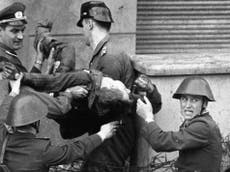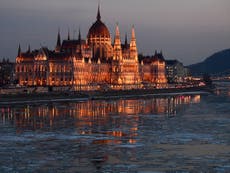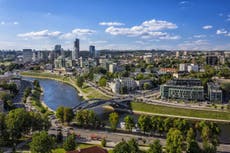The West looks down on Eastern Europe – but we need to work together on issues like climate change
Europe has been divided for too long, even with the Berlin Wall being felled 30 years ago. Now is the time for shared objectives


In the run-up to anniversary of Berlin Wall’s dismantlement, Eastern Europe have faced criticism over the the failure to live up to the promise of 1989. There are many reasons to be disappointed.
The backsliding of democratic standards in Hungary and Poland, once poster children of the EU accession policy, casts a shadow over the European project. Likewise the failure of Romania and Bulgaria to usher in fundamental changes in the political system and the ruling class is another reason for discontent.
Often overlooked are the great economic advances of the region, particularly in Poland. And given that these days Paris and Madrid are equally as likely to receive Amnesty International condemnation as Budapest or Warsaw, are these old Iron Curtain dividing lines even useful any more in understanding Europe’s shared challenges and struggles? Authoritarianism and corruption in central and eastern Europe are real threats but do we risk placing too much stock in the narrative of democracy’s deterioration in the east while overlooking its imperilment in the west?
Apart from Germany’s regular reflections on their unification, the bumpy ride of western European democracy decades after the fall of the wall is scarcely explored. Spain has spent forty years emerging from the Franco dictatorship and yet in recent years has witnessed an decline in media freedoms and a narrowing of rights to protest. The 2015 ‘gag laws’ saw police officers being granted the power to dole out administrative sanctions, previously the preserve of judges, for a variety of protest actions.
French counter-terrorism measures have seen lengthy states of emergency during which police have been granted sweeping powers to arrest, search homes without warrants and close places of worship. A UN Special Rapporteur has noted that Muslims are disproportionately affected by these laws, turning them into a ‘suspect community’ and having profound effects on civil liberties.
When in opposition, Denmark’s now-governing party Social Democrats supported some of the continent’s most draconian anti-immigration legislation including permitting the confiscation of refugees’ jewellery to offset the costs of their stay, buying ad space in Lebanese newspapers to discourage would-be asylum seekers and suspending co-operation with a UN resettlement scheme. One can argue that the only reason that the far-right Danish People’s Party saw its vote share plummet this summer was due to their language and ideas being co-opted by ostensibly liberal parties - part of a regrettable European trend.
Pantomime villains, like Hungary’s Prime Minister Viktor Orban, will always fill breathless column inches but many of the harsh measures to tackle irregular migration they espoused are now EU policy. Spain, France and Denmark, of course, continue to be democracies but with major blind spots. Just as the discontentment and hardship of the period up to 1989 hastened the Iron Curtain’s fall so too the deepening economic insecurities and inflammatory rhetoric of today are pushing people onto the street in protest. Xenophobia, mistrust of institutions and climate change are shared threats across the continent, diluting the idea of an west-east split.
During the heady days of post-communist transition, some western businesses saw the opportunity to invest, and make significant profits, in eastern Europe where checks and balances were much weaker than back home. In the east, the leadership of 1990s and early 2000s overestimated the feasibility of importing fully worked-out western models and enabled politicians across the region to suppress democratic standards, minority rights and popular protests. Decades later, EU-mandated austerity measures in Greece lead to a 25 per cent drop in GDP – comparable to a wartime situation. Those actions fuelled distrust of the EU by Greeks and non-Greeks alike.
Though it would appear that an east-west chasm was opened up by squabbles over how to respond to the 2015 refugee crisis, in reality simmering resentment at the perceived upstairs-downstairs relationship between the rich nations and the poorer nations in Europe has always served as a recruiting tool for populist rage. Western Europe has ignored or enabled troublesome governments when it suits them and feigned shock at their subsequent excesses. Luckily, despite rampant pessimism, an organic eastern fightback is occurring.
A key takeaway from a recent YouGov survey, commissioned by Open Society Foundations, is that there is abundant energy for action across the region, fuelled by youth. One needs only to look at the election of President Zuzana Caputova in Slovakia, the swell of demonstrations against Czech Prime Minister Andrej Babis’ overreach and the victories of united opposition at the local elections in Hungary.
Big anniversaries such as the one coming this week remind us that Europe will need to set new goals. Defending the rights of the weak, preventing climate change and ensuring more equal prosperity should be our shared objectives to push forward the stalled legacy, on both sides.
Goran Buldioski is director of the Open Society Foundations’ Berlin office and a co-director of the Open Society Initiative for Europe.






Join our commenting forum
Join thought-provoking conversations, follow other Independent readers and see their replies